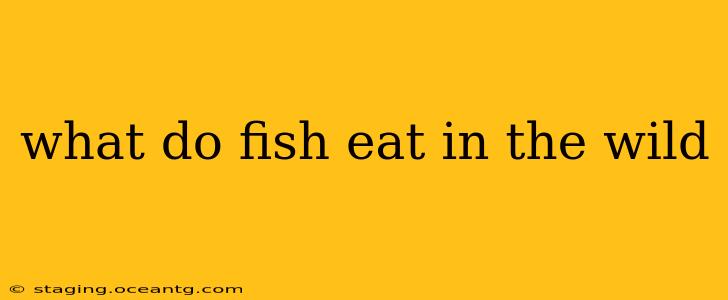What Do Fish Eat in the Wild? A Deep Dive into Aquatic Diets
The question of what fish eat in the wild is far more complex than a simple answer. Fish diets are incredibly diverse, shaped by factors like species, habitat, and the available food sources within their environment. From tiny plankton to larger prey, the aquatic world offers a vast and varied menu. This exploration will delve into the fascinating feeding habits of fish, addressing common questions and uncovering the intricacies of their dietary needs.
What types of food do different fish eat?
Fish exhibit a remarkable range of dietary preferences. Some are herbivores, primarily consuming plants, algae, and other aquatic vegetation. Examples include many species of carp, goldfish, and certain types of catfish. Others are carnivores, relying on a diet of other animals. Carnivorous fish can specialize further, with some targeting smaller fish (piscivores), while others prefer invertebrates like crustaceans, insects, or mollusks. Examples of piscivores include largemouth bass, pike, and barracuda. Still others are omnivores, incorporating both plant and animal matter into their diet, making them highly adaptable to varying food sources. Many freshwater fish like sunfish are omnivores.
What do saltwater fish eat?
Saltwater fish display an even greater diversity in their diets, reflecting the richness and complexity of marine ecosystems. Many rely on plankton, microscopic organisms forming the base of the marine food web. Larger fish may consume smaller fish, squid, crustaceans such as shrimp and crabs, and even seabirds in certain cases. The sheer size and diversity of the ocean creates highly specialized dietary niches. Think of the anglerfish, using bioluminescence to lure prey, or the whale shark, a filter feeder consuming vast quantities of plankton.
What do freshwater fish eat?
Freshwater fish diets are as diverse as their habitats. Many species are insectivores, feeding on insects that fall onto the water's surface or live within the water column. Others feed on aquatic plants, snails, and worms. In larger freshwater ecosystems, larger fish like pike or muskie become apex predators, feeding on other fish and amphibians. The availability of food heavily influences the diet of freshwater fish, and their adaptability to different food sources is critical to their survival.
What do small fish eat?
The diet of small fish often depends on their size and the availability of food. Many are zooplanktivores, meaning their diet consists primarily of zooplankton – tiny animals found floating in the water. Others may eat insect larvae, small crustaceans, or even algae. Their small size limits their hunting capabilities, so they mostly feed on smaller, easier-to-catch prey.
What do big fish eat?
Larger fish are often apex predators in their ecosystems. Their diets commonly include smaller fish, but also squid, crustaceans, and occasionally birds or mammals. Size provides them a significant advantage in hunting and allows them access to a wider range of prey items.
What is the main food source for most fish?
While there's no single "main" food source for all fish, plankton, in various forms, plays a crucial role in the diets of many species, especially smaller fish and those occupying lower trophic levels. In essence, plankton forms the foundation of the aquatic food web, supporting a wide array of fish species. In short, the answer depends heavily on the specific fish in question.
Understanding the diverse feeding habits of fish provides a glimpse into the complex interrelationships within aquatic ecosystems. Each species has adapted its diet to its environment, contributing to the intricate balance of life in the water. Further research into specific fish species will reveal even more fascinating details about their feeding strategies and the role they play in their environment.
